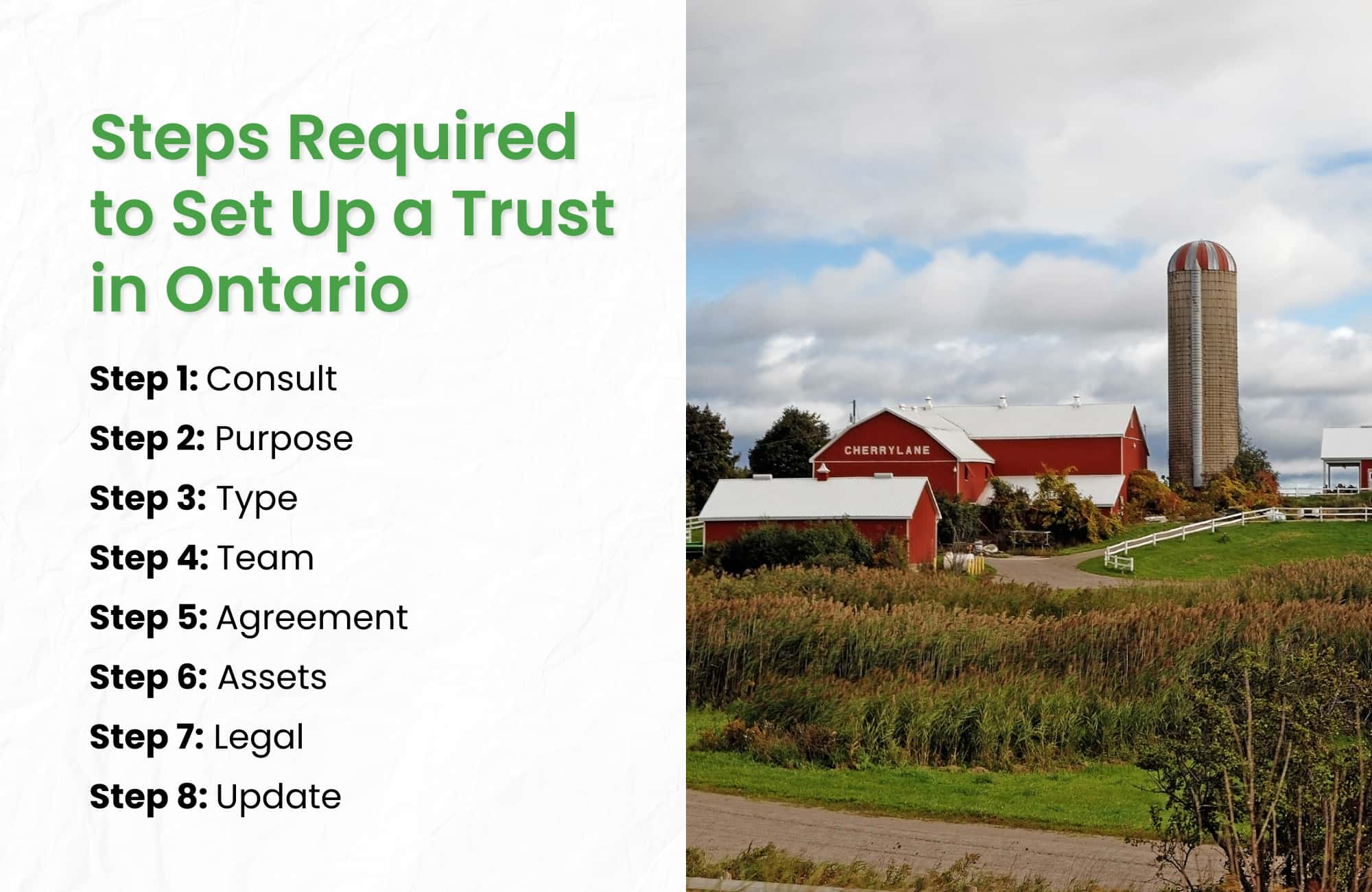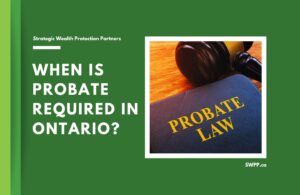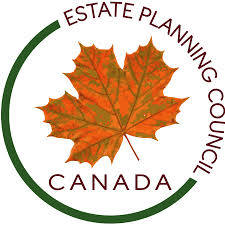Written by Ron Cooke, President & Founder of Strategic Wealth Protection Partners in Ontario, CEA®, Member of the Estate Planning Council Canada
Trusts and Estate Planning in Ontario
Thinking about setting up a trust in Ontario but not sure where to start?
You likely want to know how trusts work, which type is best for their situation, and what steps are involved. Whether you’re looking to protect your assets, minimize taxes, or create a plan for your loved ones, setting up a trust in Ontario may be a smart financial move.
Just remember, a trust won’t solve every tax and estate planning problem you have. So make sure you work with an Ontario estate planning expert who can help you cover all the bases.
In this guide, we’ll walk you through the process, costs, and key considerations to help you make informed decisions with confidence.

Table of Contents
- How to Set Up a Trust in Ontario
- Steps Required to Set Up a Trust in Ontario
- Who Should Consider Setting Up a Trust?
- How Trusts Work in Ontario
- Key Benefits of Setting Up a Trust
- Pros and Cons of Trusts in Ontario
- Potential Downsides of Setting Up a Trust
- Tax Implications of Trusts in Ontario
- Costs and Timeline for Establishing a Trust
- Selecting the Right Trustee
- Common Misconceptions About Trusts
- Common Questions about Trusts in Ontario
- Final Thoughts
How to Set Up a Trust in Ontario
Setting up a trust in Ontario begins with a clear purpose and intention.
What do you want the trust to achieve?
Next, you’ll choose the type of trust that fits your goals, and then select a trustworthy and capable trustee to manage it. You’ll need to draft a trust deed or agreement that outlines the terms, beneficiaries, and powers of the trustee, ensuring it aligns with Ontario law.
Transferring assets into the trust is a crucial step, as the trust only becomes active once it holds property.
Proper documentation, legal guidance, and careful planning are essential to ensure your trust is valid, tax-efficient, and structured for long-term protection.
But before you begin any of these steps, make sure that you seek the advice of an estate planning expert. If you have assets of $3M or more, please schedule a call with SWPP to find out if a trust is right for you.
📖 Related Read: Guide to Holding Property in a Trust in Ontario

Steps Required to Set Up a Trust in Ontario
- Consult: Reach out to an estate planning expert to find out if a trust makes sense for you.
- Purpose: Identify the purpose of the trust, such as asset protection, tax planning, or providing for dependents.
- Type: Choose the appropriate type of trust: inter vivos (during lifetime) or testamentary (through a will).
- Team: Appoint key parties, including the settlor, trustee(s), and beneficiary(ies).
- Agreement: Draft the trust agreement or include trust terms in a will, clearly outlining terms and conditions.
- Assets: Transfer assets into the trust and consider any tax implications of those transfers.
- Legal: Register and administer the trust, including filing any required tax returns and managing distributions.
- Update: Review and update the trust regularly to reflect changes in law, finances, or personal circumstances.

Who Should Consider Setting Up a Trust?
If you’re reading this, there’s a good chance you care deeply about protecting what you’ve worked so hard to build. Trusts aren’t just for the ultra-wealthy—they’re for anyone who wants to take intentional steps to reduce probate fees, avoid estate delays, and protect their legacy.
You should strongly consider a trust if you are:
- A business owner who wants to shield your assets and ensure your company continues smoothly if something happens to you.
- A parent or grandparent looking to protect your children’s or grandchildren’s inheritance from creditors, divorce, or poor decision-making.
- Someone with a blended family, or with special needs beneficiaries, where added control and structure is vital.
- A person with real estate or investments that could otherwise trigger costly taxes and legal fees when you pass.
A trust gives you the ability to guide your wealth after you pass away. Imagine the peace of mind knowing your loved ones are protected, and your values are passed down with your assets. It’s not just financial—it’s emotional security for your family’s future.
Now picture this: your family, during a difficult time, not having to deal with court delays, legal battles, or frozen bank accounts. That’s what a well-crafted trust can do.
How Trusts Work in Ontario
A trust in Ontario is a legal relationship where a settlor transfers assets to a trustee to manage on behalf of beneficiaries.
This structure allows you to control how and when your assets are used—during your life or after you’re gone. Trusts are governed by Ontario’s legal framework and must follow specific rules to be valid, which is why professional guidance is crucial.
When set up properly, trusts can reduce taxes, bypass probate, and protect your family’s privacy and future.

Key Benefits of Setting Up a Trust
A trust offers powerful advantages for those who want more control, privacy, and protection in their estate plan.
It can shield your assets from creditors, lawsuits, and family conflicts, while ensuring they are distributed according to your wishes. Trusts can also help you minimize taxes, bypass Ontario’s probate process, and preserve more of your wealth for your loved ones.
Unlike a will, a trust can be custom-tailored to fit complex family dynamics or ongoing financial needs..
Pros and Cons of Trusts in Ontario
A trust doesn’t work for everyone, which is why it’s key that you seek professional guidance.
However, this pro and con table will give you a brief overview of the benefits and downsides of using a trust. Also, keep in mind that there are many types of trusts.
| Pros | Cons |
|---|---|
| Avoids probate – Trust assets can pass outside the will, saving time and probate fees. | Legal and setup costs – Establishing a trust usually requires a lawyer and can be expensive. |
| Privacy – Trusts are not public documents, unlike wills filed for probate. | Ongoing administration – Trustees must keep records, file tax returns, and comply with fiduciary duties. |
| Tax planning opportunities – Some trusts allow income splitting or capital gains deferral. | Possible tax complications – Improper structuring may lead to unintended tax consequences (e.g., attribution rules). |
| Asset protection – Can protect assets from creditors or legal claims in certain cases. | Limited flexibility – Once assets are transferred, the settlor may lose control depending on the trust type. |
| Support for vulnerable beneficiaries – Useful for minors, individuals with disabilities, or those who need structured support. | CRA scrutiny – Trusts are subject to evolving tax rules and increased oversight from the Canada Revenue Agency. |
| Continuity of management – Ensures ongoing asset management if the settlor becomes incapacitated or dies. | Not always needed – For simple estates, a will may be sufficient without the complexity of a trust. |
Potential Downsides of Setting Up a Trust
While trusts offer many advantages, they’re not always the right solution for every situation.
Setting one up involves legal complexity, upfront costs, and ongoing administrative responsibilities for the trustee. If not properly managed, a trust can lead to unintended tax consequences or disputes among beneficiaries. In Ontario, some types of trusts are subject to annual tax filings and higher tax rates, especially if income remains within the trust.
There’s also the emotional weight of choosing the right trustee—someone you trust completely to carry out your wishes without bias or conflict.
At SWPP, we’re here to help you navigate these challenges and design a trust that works for your family and your future.
Tax Implications of Trusts in Ontario
Trusts in Ontario are considered separate legal entities for tax purposes and are generally taxed at the highest marginal tax rate unless they qualify as a graduated rate estate or meet specific exceptions.
While this can seem like a disadvantage, strategic planning—such as distributing income to beneficiaries in lower tax brackets—can significantly reduce the overall tax burden. One of the most powerful tax benefits of a trust is its ability to bypass probate, which not only avoids delays but can also save thousands in probate fees and protect your family’s privacy.
That said, trusts must file annual tax returns (T3) and follow CRA rules closely to remain compliant.

Costs and Timeline for Establishing a Trust
The cost of setting up a trust in Ontario can vary depending on its complexity, ranging from $2,500 to $7,500 or more for legal and professional fees.
More intricate trusts, such as those involving multiple beneficiaries or business assets, may require additional planning and documentation. Most trusts can be established within 2 to 6 weeks, assuming all decisions and documents are prepared efficiently.
While the upfront investment may seem significant, the long-term savings in probate fees, taxes, and family stress can far outweigh the initial cost.
Selecting the Right Trustee
Choosing the right trustee is one of the most critical decisions you’ll make when setting up a trust.
This person or institution will be responsible for managing your assets, following the terms of the trust, making fair decisions, and acting in the best interests of your beneficiaries. A trustee must be honest, organized, impartial, and capable of handling financial and legal matters—often for many years.
Whether you select a family member, close friend, or professional trustee, the key is to choose someone who will honour your wishes with integrity and care.
Common Misconceptions About Trusts
Many people believe trusts are only for the wealthy.
But in truth, trusts can benefit anyone who wants to protect their assets, reduce taxes, or ensure a smooth transfer of wealth.
Another common myth is that trusts eliminate all taxes, when in reality, they’re subject to their own tax rules and must be carefully structured to achieve the desired savings. Some assume a will offers the same protection, but unlike a trust, a will must go through probate, which can be time-consuming, costly, and public.
Others think setting up a trust is overly complicated or expensive, yet with the right guidance, it can be a streamlined, affordable, and deeply rewarding strategy. The biggest misconception of all? That you have plenty of time to plan.

Common Questions about Trusts in Ontario
What are the disadvantages of a trust in Canada?
Trusts can be costly to set up and maintain, and they come with strict legal and tax reporting requirements. If not properly managed, they can create unintended tax consequences or administrative burdens.
How much does a trust cost in Ontario?
Setting up a trust typically costs between $2,500 and $7,500, depending on its complexity and the professionals involved. Ongoing costs may include accounting, legal, and trustee fees.
How do trusts work in Ontario?
A trust is a legal structure where a trustee manages assets on behalf of beneficiaries according to instructions set out by the settlor. It allows for control, protection, and strategic distribution of assets during life or after death.
What is the biggest mistake parents make when setting up a trust fund?
Many parents fail to clearly define the terms or choose an appropriate trustee, leading to future conflicts or misuse of funds. Others overlook long-term tax implications or don’t update the trust as circumstances change.
If you have a lot of family members, can you use a trust to protect a family cottage or property?
Yes, a trust is an excellent tool to protect a family cottage or shared property across generations. It provides structure, control, and clarity on ownership, use, and inheritance.
What is an inter vivos trust?
An inter vivos trust, also called a living trust, is created during the settlor’s lifetime to manage and distribute assets while they are still alive. It can help avoid probate and provide ongoing asset management.
What is a family trust?
A family trust is typically used to hold and protect assets for the benefit of family members, often to minimize taxes and control how wealth is transferred. It can include children, grandchildren, or even future generations as beneficiaries.
What are the tax consequences of having a trust?
Most trusts in Canada are taxed at the highest marginal rate unless they qualify for exceptions. However, with proper planning, trusts can be used to distribute income to beneficiaries in lower tax brackets to reduce overall tax.
Can a trust help you to avoid estate taxes in Ontario?
Yes, trusts can help defer or reduce estate taxes and avoid probate fees by removing assets from your estate. When structured properly, they preserve more of your wealth for your loved ones.
Final Thoughts
Setting up a trust can be a powerful way to achieve long-term financial security for yourself and your loved ones.
By properly structuring a trust as a separate legal entity, you can effectively manage trust property, protect trust assets, and, in some cases, reduce your overall tax liability. Whether you’re planning to leverage the lifetime capital gains exemption, optimize your personal tax credit, or simply ensure a smoother transfer of wealth, a carefully drafted trust document is essential.
Keep in mind that Ontario’s tax rules are complex, and trusts must be set up and managed with precision to maximize their benefits. While a trust may not be the right solution for everyone, it remains a valuable estate planning tool when used strategically.
Be sure to consult a qualified estate planning professional who understands the nuances of Ontario’s estate planning landscape to ensure your trust aligns with your goals and protects your legacy.
Key Takeaways:
- Trusts offer control, privacy, and protection over how and when your wealth is distributed.
- Avoiding probate and minimizing taxes are major advantages when trusts are used effectively.
- The right type of trust depends on your family, assets, and long-term goals.
- Selecting the right trustee is crucial—choose someone capable, impartial, and trustworthy.
Work with an Ontario-based estate planning professional to ensure your trust meets legal standards and serves its intended purpose.
Discover the Benefits of a Living Trust in Ontario
Are you an Ontario resident considering a living trust as part of your estate planning?
At Strategic Wealth Protection Partners, we’re here to guide you through every step of the process with expert advice and personalized support. Begin your estate planning journey today with a Living Estate Plan Consultation from our experienced team.
Our mission at SWPP is to help you create an estate plan that secures your legacy, shields your assets from unnecessary taxation, and ensures your loved ones are cared for. By designing a living trust tailored to your goals, our experts will help you build a plan that truly reflects your values and priorities.
Take control of your future—start planning today!
Schedule a Living Estate Plan Consultation
Planning your legacy is about more than numbers—it’s about ensuring your family remembers you and your values are honoured for many years to come.
Estate planning and trusts can feel overwhelming, especially if it’s your first time. That’s why we’re here.
With our simple, 5-Step Living Estate Plan, we make the process easy, helping you create a comprehensive estate plan or trust that protects your assets from taxes and probate fees while preserving your legacy. Tools like The Final Word Journal capture your story, wishes, and essential details like accounts and end-of-life plans, ensuring your family has clarity and comfort.
Take the first step today—schedule a consultation call and give your family the ultimate gift: peace of mind and the assurance they were always your priority.
Read More
If you’re starting your estate planning process, you may find these articles helpful:
- Can I Put My House in a Living Trust in Canada?
- What Is the Tax Rate for Trusts in Canada?
- What Is the Downside of an Irrevocable Trust in Canada?
About the Author
RON COOKE, PRESIDENT & FOUNDER OF STRATEGIC WEALTH PROTECTION PARTNERS

With over 30 years in financial services, I’ve seen the challenges families face when a loved one passes—lost assets, unnecessary taxes, and emotional stress. That’s why I created the Living Estate Plan, a comprehensive process to protect assets, eliminate estate and probate fees, and create legacies that are remembered for many years to come.
This plan ensures your family receives not just your wealth, but a meaningful reminder of your care and love. Tools like The Final Word Journal capture your story, wishes, and essential details, offering clarity and comfort during difficult times.
Your final gift should be more than money—it should be peace of mind, cherished memories, and an organized estate.
Schedule a Call
Schedule a 30-minute consultation call with Strategic Wealth Protection Partners.
Click HERE to schedule a consultation.









